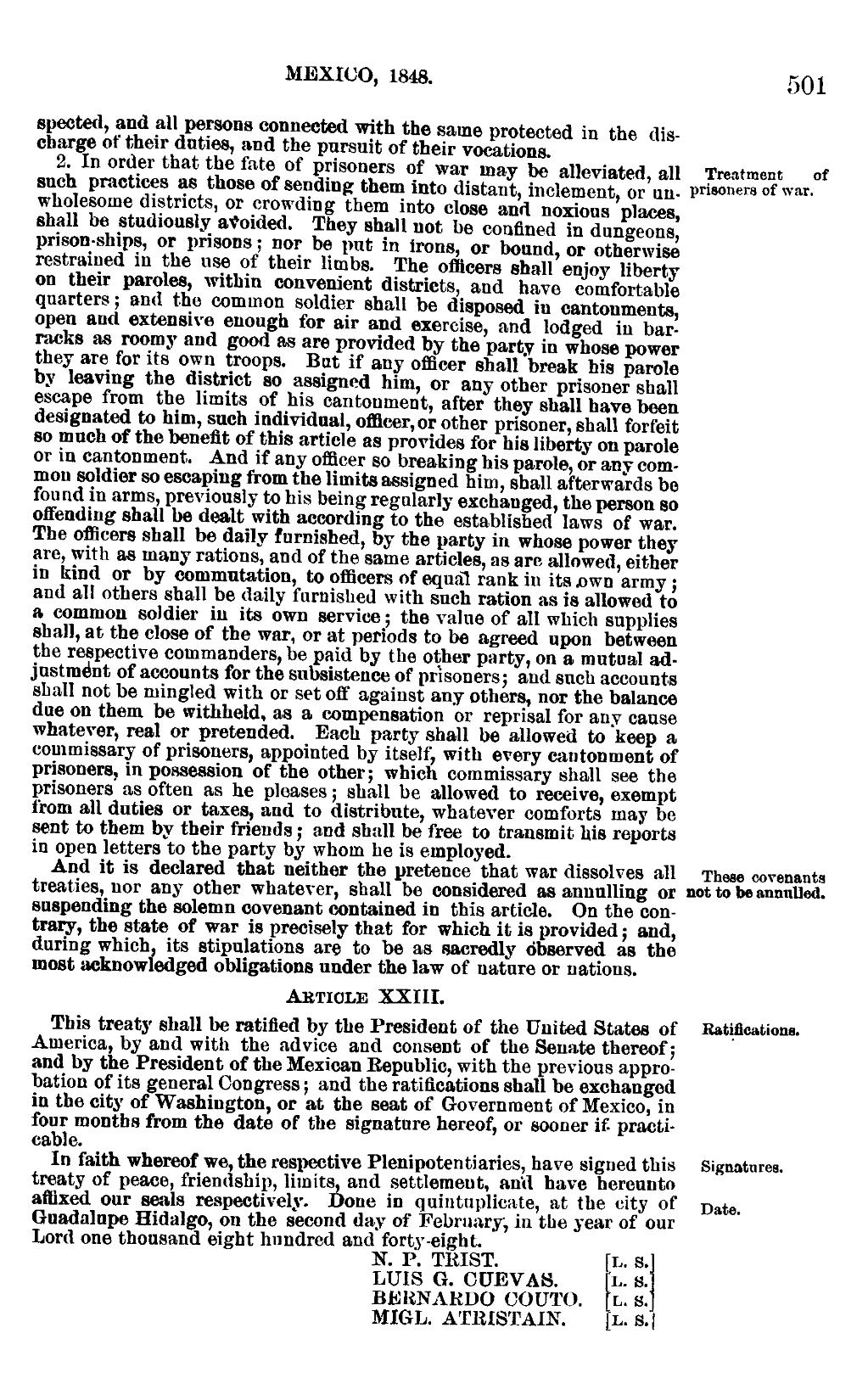MEXICO, 1848. 501 spected, and all persons connected with the same protected in the discharge of their duties, and the pursuit of their vocations. 2. In order that the fate of prisoners of war may be alleviated, all Treatment or such practices as those of sending them into distant, inclement, or un- P'i°°¤€” °f W"- wholesome districts, or crowding them into close and noxious places, shall be studiously avoided. They shall not be confined in dungeons, prison—ships, or prisons; nor be put in irons, or bound, or otherwise restrained in the use of their limbs. The officers shall enjoy liberty on their paroles, within convenient districts, and have comfortable quarters; and the common soldier shall be disposed in cantonments, open and extensive enough for air and exercise, and lodged in barracks as roomy and good as are provided by the party in whose power they are for its own troops. But if any officer shall break his parole by leaving the district so assigned him, or any other prisoner shall escape from the limits of his cantonment, after they shall have been designated to him, such individual, officer, or other prisoner, shall forfeit so much of the benefit of this article as provides for his liberty on parole or in cantonment. And if any officer so breaking his parole, or any common soldier so escaping from the limits assigned him, shall afterwards be found in arms, previously to his being regularly exchanged, the person so olfending shall be dealt with according to the established laws of war. The officers shall be daily furnished, by the party in whose power they are, with as many rations, and of the same articles, as are allowed, either in kind or by commutation, to officcrs of equal rank in its own army ; and all others shall be daily furnished with such ration as is allowed to a common soldier in its own service; the value of all which supplies shall, at the close of the war, or at periods to be agreed upon between the respective commanders, be paid by the other party, on a mutual adjustment of accounts for the subsistence of prisoners; and such accounts shall not be mingled with or set off against any others, nor the balance due on them be withheld., as a compensation or reprisal for any cause whatever, real or pretended. Each party shall be allowed to keep a. conimissary of prisoners, appointed by itself, with every cantonment of prisoners, in possession of the other; which commissary shall see the prisoners as often as he pleases; shall be allowed to receive, exempt from all duties or taxes, and to distribute, whatever comforts may be sent to them by their friends; and shall be free to transmit his reports in open letters to the party by whom he is employed. And it is declared that neither the pretence that war dissolves all Thug cm-aunts treaties, nor any other whatever, shall be considered as annulling or nottobeannuned. suspending the solemn covenant contained in this article. On the contrary, the state of war is precisely that for which it is provided; and, during which, its stipulations are to be as sacredly observed as the most acknowledged obligations under the law of nature or nations. Aurronn XXIII. This treaty shall be ratified by the President of the United States of Ratineatione. America, by and with the advice and consent of the Senate thereof; and by the President of the Mexican Republic, with the previous approbation of its general Congress; and the ratiiications shall be exchanged in the city of Washington, or at the seat of Government of Mexico, in four months from the date of the signature hereof, or sooner if practicable. In faith whereof we, the respective Pleuipotentiaries, have signed this Signatures. treaty of peace, friendship, limits, and settlement, and have hereunto affixed our seals respectively. Done in quintuplicate, at the city of D,,_t,,_ Guadalupe Hidalgo, on the second day of February, in the year of our Lord one thousand eight hundred and forty-eight. N. P. TRIST. [L. s.] LUIS G. CUEVAS. [1,. s.} BERNARDO UOUTO. [L. s. MIGL. ATRISTAIN. [L. s.]
